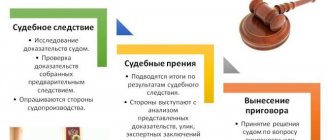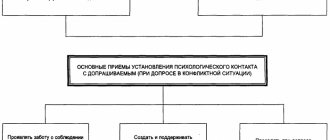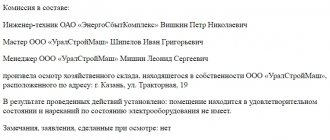When a criminal case has been initiated and a citizen is invited to give evidence to the Investigative Committee, the department of inquiry, it is more or less clear how to behave taking into account the status - witness, accused or suspect, victim (in a number of articles we told how to behave during interrogation ).
When a criminal case has not yet been initiated, and you are invited orally or by an official summons to the department to give explanations, your procedural status is unclear, and it is often unclear why you are being summoned. What rights do citizens have when giving an explanation, whether it is possible to refuse to carry out this procedure - this is discussed in our article.
What is an explanation
This is a certain form of securing evidence in writing.
Any information that comes from a person is documented by a law enforcement officer in the form of a written explanation. This is done in order to compile verification material into which all collected documents, including explanations, are filed. The obligation to conduct an inspection for each detected fact of an offense or for a statement received by the police is enshrined in the Code of Criminal Procedure of the Russian Federation and the Code of Administrative Offenses of the Russian Federation.
Question: Is it possible to select an explanation orally?
The Police Law does not prohibit receiving oral explanations about the events of the incident, but without written form they will not have evidentiary value later. Meanwhile, law enforcement officers often use oral explanations from citizens in their work to find out the details of what happened and find those responsible.
For example , neighbors called the police because of noise in the apartment above at night. Having arrived at the scene, the police will begin to figure out why the neighbors contacted the police, interview them by obtaining a written explanation, then go up to the apartment where the noise was made. Everyone who was in it will also be required to give written explanations. Under the described circumstances, the police usually identify the owner of the apartment and interview him, even if he was not in the home at the time the offense was committed. If the apartment is for rent, the police, by asking neighbors and the chairman of the Criminal Code, will establish who it is registered to. Explanations about the apartment owner’s data in this situation can be obtained orally; they do not have to be recorded in the form of written explanations. Thus, important information that is not directly related to the event of the offense may well be obtained orally.
An explanation should be distinguished from an interrogation - after the initiation of a criminal case (documented by a resolution), explanations are no longer taken, since interrogations are carried out with the drawing up of protocols by the official in whose proceedings the materials are located.
Before a criminal case is initiated, they are usually interviewed by local police officers or detectives, but as part of checking a report of a crime, interrogators, investigators of the Investigative Committee, FSB, Drug Control, Prosecutor's Office, etc. are also entitled to interview.
For administrative offenses, the survey is carried out by representatives of law enforcement agencies of relevant competence - for example, in case of traffic violations, explanations are selected by traffic police officers, in case of violation of public order - by employees of the PPSP of the Ministry of Internal Affairs on the basis of the Federal Law “On Police”.
Let us remind you once again that when giving an explanation, a person has no status - neither a victim nor an accused.
At the same time, despite the lack of procedural status, a citizen has the right to refuse to give any explanations against himself and his loved ones on the basis of Art. 51 of the Constitution of the Russian Federation. It should be taken into account that with such a refusal it will be difficult to find out all the circumstances of what happened; the police will need to look for and interview other people. It would be useful to compare whether such an outcome is favorable for your position.
For example , if M.I. Petrov was injured during the incident, it is “unprofitable” for him to refuse to give an explanation, and for T.I. Sidorov, who is guilty of the crime, perhaps refusing to talk about the incident can become an advantageous line of defense.
How to write an explanation to the police, sample form
The explanation can be handwritten or typed on a computer. It must contain information relating to events of interest to the police, date, signature, place of compilation, and information about the identity of the person being interviewed.
Sometimes the police office already has an explanatory form that must be filled out in your own hand. When filling out, the investigator or district police officer may ask specific questions or ask you to write about the event as a whole, without specifying details. It all depends on the situation in connection with which the need for a survey arose, but in any case, you should remember to completely read the entire document, and only then should a personal signature be affixed with a transcript of the surname:
EXPLANATION (example)
Nsk 07/20/2020, 12:00
Investigator of the Leninsky department of inquiry of the Ministry of Internal Affairs for the city of Nsk, police captain L.O. Verbina, checking the statement of N.R. Usatova. about a crime received by the Department of the Ministry of Internal Affairs for the city of N-sk on July 17, 2020, in accordance with Part 1 of Art. 86 and part 1 of Art. 144 of the Code of Criminal Procedure of the Russian Federation, received an explanation from a citizen:
- Full name – Polyakov Andrey Gennadievich
- Year and place of birth – 09/01/1987, Nsk
- Address, telephone – st. Lenina, 50, Nsk, tel. 8934848
- Passport, citizenship - 1111 No. 646464, issued on January 31, 2017 at the Federal Migration Service for Ns-ku, Russian Federation
- Education, marital status – higher, single
- Place of work – temporarily closed.
Provisions of Art. 51 of the Constitution of the Russian Federation, the right to a lawyer is explained and understandable. I want to give explanations, I don’t need a lawyer.
Based on the essence of the questions asked to me, I can explain the following. With Usatova N.R. I know her, she is my roommate, I have no hostile relationship with her, I live with her at the above address. 07/17/2020 I, Usatova N.R., Golikov P.D. At about 20:00 we all drank alcoholic drinks together at our house, at the address: st. Lenina, 50, Nsk. Between me and Usatova N.R. there was a conflict in which P.D. Golikov intervened. The latter was heavily intoxicated and began to threaten N.R. Usatova. with a knife and hit her in the face. The blow was struck with the right hand (palm) twice, causing a bruise to form on the woman’s partner. Usatova contacted the medical center and the police. There is nothing more to explain.
Handwritten, signature, full name.
The explanation was accepted by: investigator of the Leninsky department of inquiry of the Ministry of Internal Affairs for the city of N-sk, police captain Verbina L.O., signature.
This sample statement to the police can be used in different situations.
If the document was printed from the words of a citizen, then at the end it is necessary to sign “from my words it was written (printed) correctly, read by me.” And only after the compiled text has actually been read, it is necessary to put your signature.
Ask for a copy of the explanation or take a photograph with the permission of the investigator.
Submission of copies of documents from the criminal case materials to the arbitration court
Often in legal practice there is a need to obtain copies of documents from the materials of a criminal case pending in a court of general jurisdiction for their submission to the arbitration court. For example, a lawyer is the defender of a person accused of committing a crime and at the same time represents his interests in the arbitration process. At the same time, the information contained in the materials of the criminal case is extremely important for confirming the arguments in the arbitration court.
If, after considering the petition for the issuance of copies of documents from the criminal case materials, the judge certifies the requested copies, everything is fine. But what if not?
I will try to answer this question and propose an algorithm for action in this case.
Let's consider the procedure for obtaining copies of documents from case materials that are being processed by a court of general jurisdiction or have already been considered by this court and are in the archive.
Record keeping and document flow in courts of general jurisdiction are carried out in accordance with the Instructions for judicial record keeping in the supreme courts of republics, regional and regional courts, courts of federal cities, courts of the autonomous region and autonomous districts, approved by the Order of the Judicial Department at the Supreme Court of the Russian Federation of December 15, 2004 No. 161 (ed. October 28, 2021).
In accordance with clause 12.20 of the Instructions, the right to copy documents from the case materials at one’s own expense, including using technical means, is granted to accused, defendants, convicted, acquitted, their defenders and representatives (clause 13, part 4, article 47, clause 7, part 1, article 53 of the Code of Criminal Procedure of the Russian Federation), victims (clause 12, part 2, article 42 of the Code of Criminal Procedure), the civil plaintiff, as well as his representative in terms of copies of procedural decisions related to the brought claim (clause 13, part 4 Article 44 of the Code of Criminal Procedure), the civil defendant and his representative regarding the materials of the criminal case that relate to the claim (Clause 9, Part 2 of Article 54, Part 2 of Article 55 of the Code of Criminal Procedure), the parties and other persons participating in the civil case, administrative case, as well as their representatives (Part 1 of Article 35 of the Code of Civil Procedure of the Russian Federation, Article 45 of the Code of Arbitration Procedures of the Russian Federation), rehabilitated persons, and with their consent or in the event of their death - relatives (dependents) in terms of familiarization with the materials of terminated criminal and administrative cases cases and obtaining their copies (Article 11 of the Law of the Russian Federation of October 18, 1991 No. 1761-1 “On the rehabilitation of victims of political repression”).
All listed persons make copies upon written application in the manner established by the chairman of the court or the judge presiding over the case. The application with the permitting resolution is filed in the court case. It is important to note that materials copied by these persons, including using technical means, at their own expense are not certified by the court.
At the same time, as stated in Part 8 of Art. 75 of the APC, written evidence is submitted to the arbitration court in the original or in the form of a duly certified copy1. If only part of the document is relevant to the case under consideration, a certified extract from it is submitted.
In accordance with Part 6 of Art. 71 of the Arbitration Procedure Code, the arbitration court cannot consider as proven a fact confirmed only by a copy of a document or other written evidence if the original document is lost or not submitted to the court, and the copies of this document presented by the persons participating in the case are not identical to each other and to establish the true content of the original source impossible with the help of other evidence.
GOST R 7.0.97-2016 “National standard of the Russian Federation. System of standards on information, librarianship and publishing. Organizational and administrative documentation. Requirements for the preparation of documents”, approved by Order of Rosstandart dated December 8, 2021 No. 2004-st, provides for the procedure and form for certification of copies of various types of documents. A copy certification mark is issued to confirm the compliance of the copy of the document (extract from the document) with the original document (clause 5.26 of the Standard). A mark on certification of the copy is placed under the “signature” attribute and includes: the word “True”, the title of the position of the person who certified the copy, his handwritten signature and its transcript (initials, surname), the date of certification of the copy (extract from the document). If a copy is issued for submission to another organization, a note on the certification of the copy is supplemented by an inscription about the storage location of the document from which the copy was made (“The original document is located in (name of organization) in file No. ˂…˃ for ˂…˃ year”), and certified by the seal of the organization. A stamp may be used to mark the certification of the copy.
Proper certification is also explained in Art. 77 Fundamentals of the legislation of the Russian Federation on notaries (approved by the Supreme Court on February 11, 1993 No. 4462-1 as amended on December 30, 2021), according to which the notary certifies the accuracy of copies of documents and extracts from documents issued by state authorities, local authorities self-government, legal entities, citizens (Part 1 as amended by Federal Law No. 379-FZ of December 21, 2013).
The procedure for certification of copies of documents emanating from organizations was also approved by paragraph 1 of the Decree of the Presidium of the USSR Armed Forces of August 4, 1983 No. 9779-X (as amended on December 8, 2003) “On the procedure for issuing and certification by enterprises, institutions and organizations copies of documents relating to the rights of citizens,” according to which state and public enterprises, institutions and organizations issue, upon applications from citizens, copies of documents necessary to resolve issues relating to the rights and legitimate interests of applicants. Copies are issued on the letterhead of enterprises, institutions and organizations.
So, when participating in the arbitration process as a representative of a party, a lawyer may be faced with the need to present to the court, in order to confirm his arguments, a copy of the interrogation protocol of a person interrogated as part of the preliminary investigation, or another procedural document located in the materials of the criminal case. At the same time, for the reasons stated above, it is possible to make a copy of the necessary documents contained in the case, but the court is not obliged to certify it (clause 12.20 of the Instructions).
Is the citizen’s right to present evidence contained in the criminal case materials to the arbitration court violated in this case? I think no.
In this case, the party to the arbitration dispute provides to the arbitration court a copy of the application submitted to the court of general jurisdiction (with a mark (stamp) of the court on its acceptance) for the issuance of copies of documents from the materials of the criminal case and the copies themselves.
Thus, the specified person (his representative) presents to the arbitration court evidence that he has applied to a court of general jurisdiction for the relevant information or copies of the materials of the criminal case, and also that the information contained in the specified documents is relevant to this dispute, and the original documents are in the materials of the criminal case cases and according to clause 12.20 of the Instruction cannot be certified by the court.
If the arbitration court has questions regarding the authenticity or completeness of the submitted copy, it has the right to request - including on its own initiative - the materials of the criminal case containing the relevant document.
So, in accordance with Part 4 of Art. 66 of the Arbitration Procedure Code, a person participating in a case and not having the opportunity to independently obtain the necessary evidence from the person who has it, has the right to apply to the arbitration court with a petition to request this evidence. The petition must indicate the required evidence, indicate what circumstances relevant to the case can be established by this evidence, as well as the reasons preventing the receipt of the evidence, and its location. It is important to take into account that materials from a criminal case (namely, individual protocols of investigative and procedural actions), as a general rule, are subject to verification and evaluation in their entirety by the court considering the criminal case on the merits, and only when making a final decision.
In this regard, in my opinion, it is more correct to refer to the materials of criminal cases only if there is a verdict that has entered into legal force.
1 A certified copy of a document is understood as one on which, in accordance with the established procedure, the details are affixed to ensure its legal significance (subclause 25, clause 3.1 of GOST R 7.0.8-2013 “National standard of the Russian Federation. System of standards for information, library and publishing case. Records management and archiving. Terms and definitions", approved by Order of Rosstandart of October 17, 2013 No. 1185-st).







